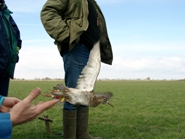The ephemeral shorebird: population history of ruffs

PhD ceremony: Ms. Y.I. Verkuil, 16.15 uur, Academiegebouw, Broerstraat 5, Groningen
Thesis: The ephemeral shorebird: population history of ruffs
Promotor(s): prof.d T. Piersma, prof. A.J. Baker
Faculty: Mathematics and Natural Sciences
Ruffs are common migratory shorebirds with a wide distribution across ephemeral inland wetland habitats of Africa and Eurasia. Their lek mating behaviour is well studied, but what ruffs accomplish outside the breeding season is far less known. Yvonne Verkuil presents in her thesis research on migration performance, adaptive distributional changes and comparative population genetics of ruffs.
Historically, ruffs are panmictic, a common feature in postglacial northern hemisphere species. Neutral genetic markers showed that ruffs survived the Last Glacial Maximum in one refugium, and the 21,000 years past since then were insufficient to evolve genetically distinct populations. That breeding destination is correlated with timing of migration and wing length, traits under selection in long-distance migrants, indicates that phenotypic structuring is probably evolving in modern ruffs. As expected for an inland shorebird with a large population size, ruffs had high genetic variation in the mitochondrial genome. In contrast, genetic variation in the nuclear genome was strongly reduced; this confirms a theoretical model predicting that lekking behaviour leads to a skew in life-time reproductive success of males. A wider comparison of nuclear genetic variation within shorebirds showed that inland species wintering on the northern hemisphere had relatively lower genetic variation than coastal species, wintering in the tropics. This contrast can be an attribute of occasional large die-off in harsh northern winters. Hence, Verkuil rejected the habitat dichotomy hypothesis, stating inland shorebirds generally have higher genetic variation than coastal species.
En route from Africa to the European and Russian Arctic, ruffs migrate through Europe. Traditionally important areas with >10.000 staging ruffs are The Netherlands, Belarus and further eastwards, Ukraine. Between 2001 and 2010 the Dutch migrants declined from over 20,000 to below 5,000, and local fueling and moulting rates decreased. Individually marked Dutch migrants shifted to alternative migration routes at least as far east as Belarus, where local migration performance (fuelling, moult) was stable. Numbers passing through Belarus increased from 2,000-6,000 in 2001 to over 15,000 in 2010. This shift of migrants between migration routes 1500 km apart, within the generation time of a species, contradicts the current consensus on genetic constraints on migration routes in species where the first migration of juveniles is steered by an inherited program instead by the parents.
The database of the International Breeding Conditions Survey on Arctic Birds revealed that the distribution of breeding birds shifted eastward in the same time period. As this shift could not be attributed to temperature changes on the Arctic breeding grounds, redistribution is assumed to be an effect of the habitat change at the western staging site in The Netherlands which Verkuil attributes to land-use changes in the agricultural landscape of Friesland.
| Last modified: | 23 August 2021 2.00 p.m. |
More news
-
29 April 2024
Tactile sensors
Every two weeks, UG Makers puts the spotlight on a researcher who has created something tangible, ranging from homemade measuring equipment for academic research to small or larger products that can change our daily lives. That is how UG...
-
29 April 2024
Behind the scenes: how UG and Hanze UAS students are jointly developing a Mars rover
This year the students of the Makercie team are participating in the physical edition of the European Rover Challenge in Poland. Read more about the team and the collaboration between the RUG and Hanze UAS here.
-
23 April 2024
Nine MSCA Doctoral Network grants for FSE researchers
Nine researchers of the Faculty of Science and Engineering have received a Horizon Europe Marie Sklodowska Curie Doctoral Network grant.
